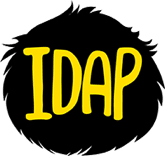Thinking about hotel booking app development?
If yes, then you found a straightforward guide to walk you through the entire process. We’ll talk about how you can make money, which type of app you can build, and how to actually make a top product that attracts thousands of users.
Get started:
- Hotel booking app market overview
- Monetization strategy for hotel booking apps
- Types of hotel booking apps
- Essential features in hotel apps
- Hotel booking app development: steps
- How much does it cost to build a booking app?
Estimate the cost of your hotel app project.
Hotel Booking App Market: Overview
The online booking app market has finally recovered after the pandemic and is showing strong growth numbers.
As we can see in the latest data, two leading hotel booking apps, Booking.com and Expedia, have generated $17 and $11.6 billion in 2022—a much better performance than the previous year:
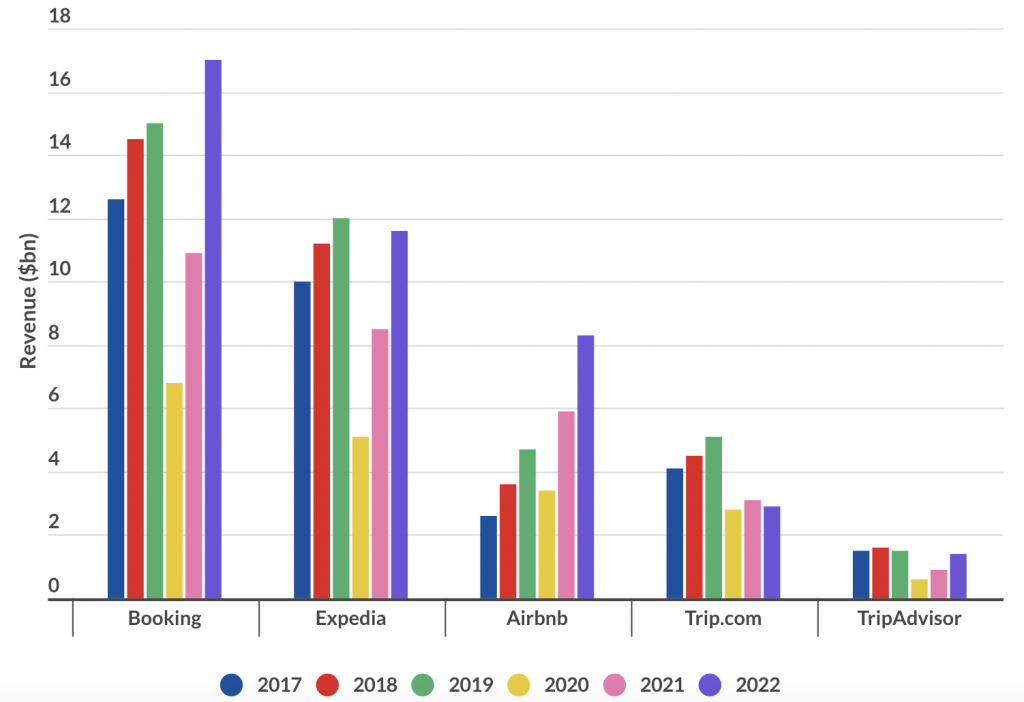
The other famous market players, including Airbnb and TripAdvisor, were also able to increase their profits. This means one thing: travel is back and may be on track to a full recovery.
For us, it also means that hotel booking app development could be a good business investment right now.
Now, in terms of the market share—
Booking.com and Airbnb are the absolute leaders among hotel booking apps, having about two-thirds of the market.
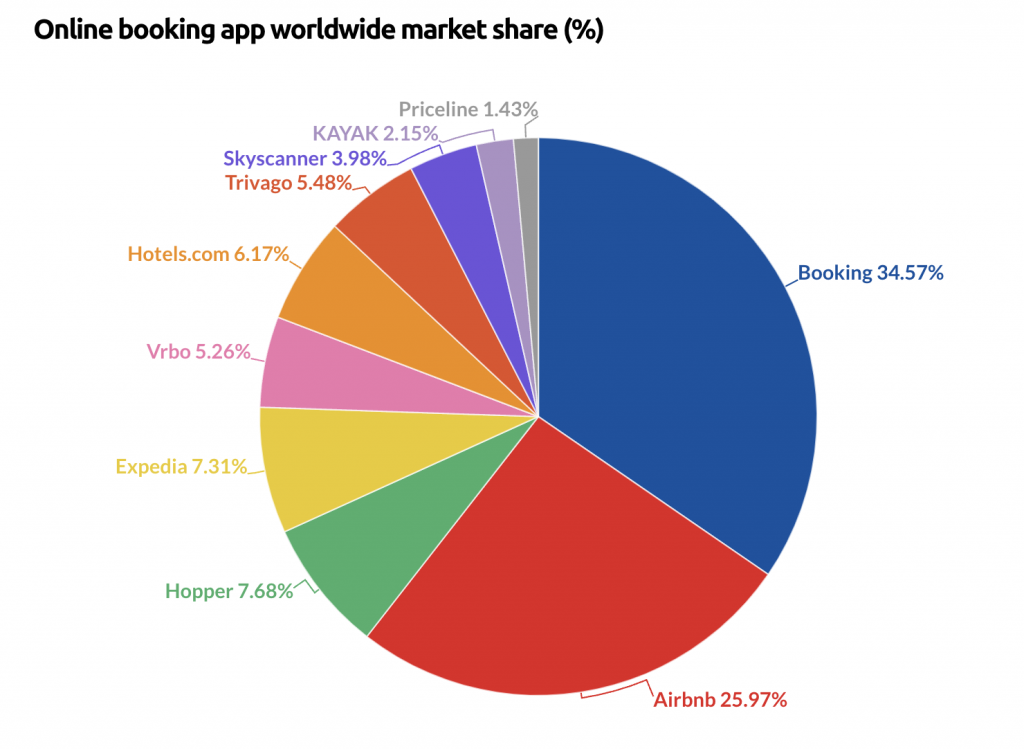
Let’s take a closer look at these two apps.
Here are a few stats on how they perform in the Google Play Store:

As you can see, the demand is there. Now, let’s see how Booking.com and Airbnb turn that demand into revenues.
Hotel Booking Apps: How They Make Money
The business model of any hotel booking app revolves around being a convenient place where anyone can plan and reserve accommodation during travel. In many cases, the apps also allow you to take care of travel (most commonly flights) and book some local attractions.
In other words, a hotel booking app is like a travel agency on a smartphone. And, pretty much like the agency, it can generate money in a few major ways.
Those revenue streams include:
- Commissions and transaction fees. Every fee for hotel bookings made through an app goes to revenue. This is the main revenue source for hotel apps
- Fees on related services. Hotel booking apps also earn from selling related services such as car sharing and taxi
- Referral and affiliate fees. You can sell hotel accommodation packages to travel agencies and other related companies
- Advertising within an app. Every square inch of screen space in a hotel booking app is a potential advertising space
If you choose to develop a hotel booking app, the fees might be the only revenue stream for some time.
But that’s all right—
As you grow and the app becomes popular, more people (travel agencies, car sharing services, etc.) will be more likely to partner with you, helping you unlock other revenue sources.
Learn more: App Monetization: How to Get Started
💡How much does Booking.com charge?
On average, Booking.com gets a 15% commission from every confirmed booking made in their app. The fees depend on the location and the type of the hotel.
Types of Hotel Booking Apps: Which to Choose?
Before you build a hotel booking app, you need to choose which type you’d like to have.
Here are your choices:
- Hotel aggregator apps
- Hotel chain apps
- Last-minute hotel booking apps
Hotel aggregator app
Those are the apps you’re probably familiar with (Booking.com is the best example of a hotel aggregator app). They act like middlemen between hotels and customers by generating listings of available offers according to the user’s filters.
This type of hotel app is the most popular because it makes hotel search straightforward for travelers. And there’s lots of ways in which you can develop this hotel app: for example, you can focus only on leisure travel, a certain type of hotel, or add extra features like car rental.

Hotel chain apps
This app type allows you to book accommodation only within a certain chain of hotels. So, for example, with the Accor hotel group’s app, you can book a room in 5,100+ properties they own, including Novotel, Ibis, and Mercure brands (see the image below).
In this case, hotel chains and companies work closely with software companies on hotel mobile app development to ensure that the app meets their branding guidelines and the desired service level.

Last-minute hotel booking apps
This app compares prices on last-minute travel vacation agencies and hotel booking websites (including Airbnb and Booking.com) to find hotels according to the user’s preferences. Many people prefer using such apps to find lower prices where they want to stay.
Besides price comparison, last-minute travel booking apps can also support direct booking, so there’s no need to go to a hotel’s website to get a deal. And, of course, they can also include deals on flights, taxis, and rental cars.
Hotwire is a good example of a last-minute hotel booking app (1+ million downloads on the Google Play Store):
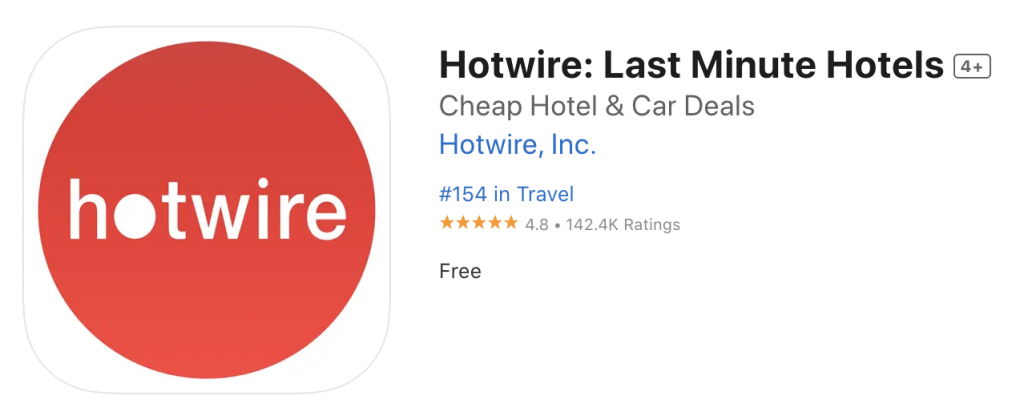
Related content from our blog: 💡10 Best Car Rental Apps for iOS and Android
The Essential Features of Hotel Booking Apps
Regardless of the type of hotel app you’ll choose, there’s a set of basic must-have features. Those features are the building blocks of any hotel booking software development process and ensure a good user experience.
The must-have features of a hotel booking app are:
- User account
- Search
- Hotel listing
- Currency management
- Booking
- In-app payment
- Payment confirmation/receipt
- Build-in chat with hotels
- Push notifications
- Saved properties
- Chatbot
- Loyalty program
User account
For starters, every user must be able to create an account to be able to save their data, personalize search results, and use the perks of a loyalty program. To create an account, the app will need an email, password, address, and other data.
Also, you might want to consider allowing non-registered users to make booking as well. In some cases, people prefer to complete bookings quickly and sign up later.
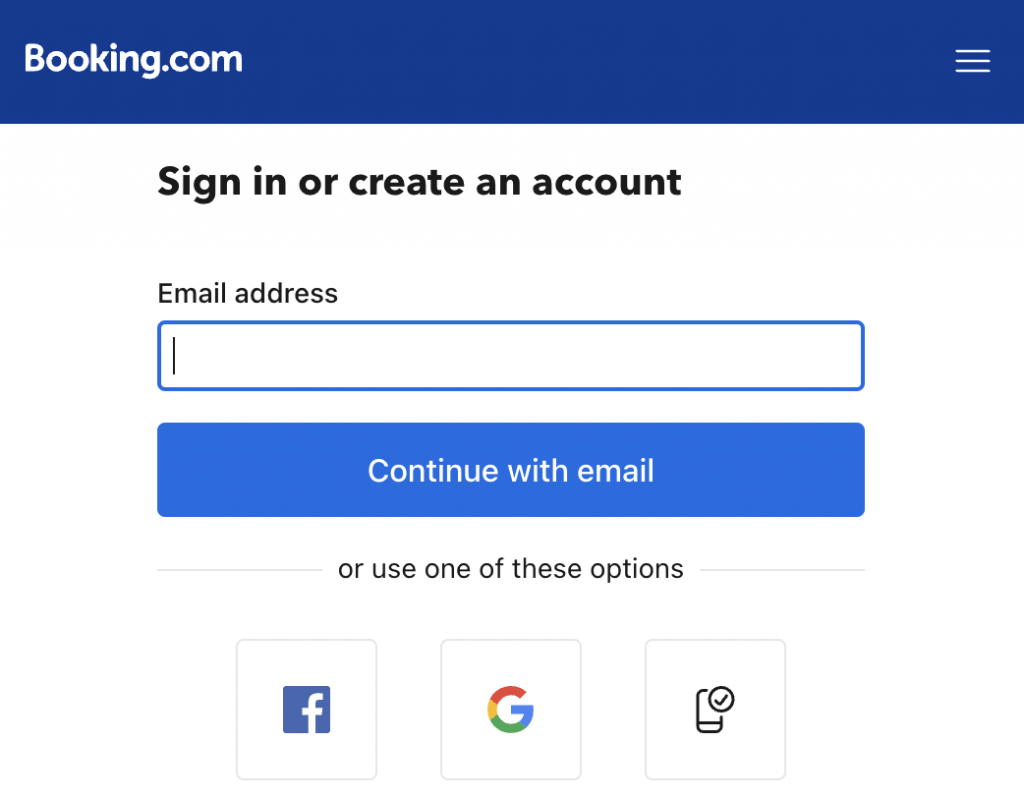
Saved properties (wish lists)
Looking for hotels and saving them for later is a typical thing for many travelers. That’s why your hotel app should also allow registered users to save properties—this data may also help to personalize search results and additional services.
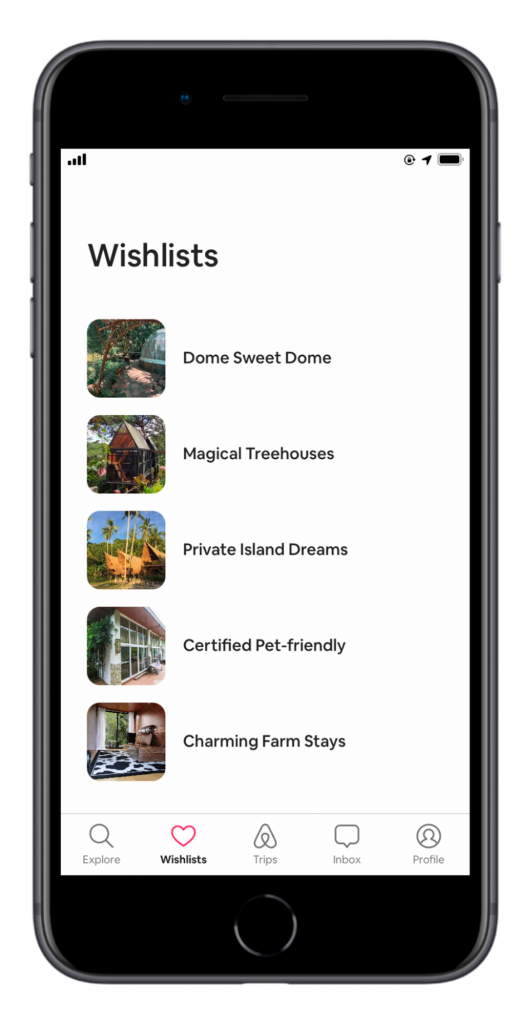
Search
A hotel app is basically a small search engine, so this feature is pretty much non-negotiable. The users must be able to enter their search requirements (location, property type, dates, etc.), add some other useful filters, and get results based on them.
Technically speaking, the kind of search feature you need is called filtered. There are a lot of aspects (filters) to consider when looking for hotels, so providing them will help to find the right property faster.
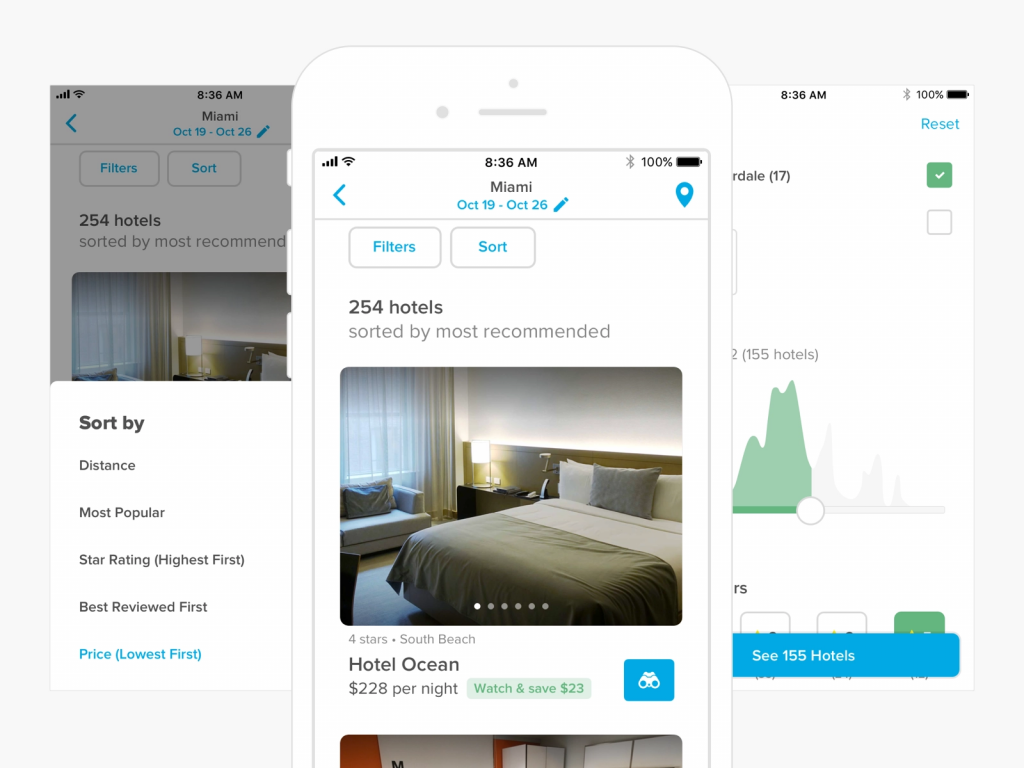
Hotel listing
This is the section with the hotel information. It includes an attractive description of the property, helpful details about rooms, the location, photos, reviews from guests, the website, and other info. In other words, this is every hotel’s business card within your app.
Here’s a typical hotel listing app (taken from Booking.com’s app):
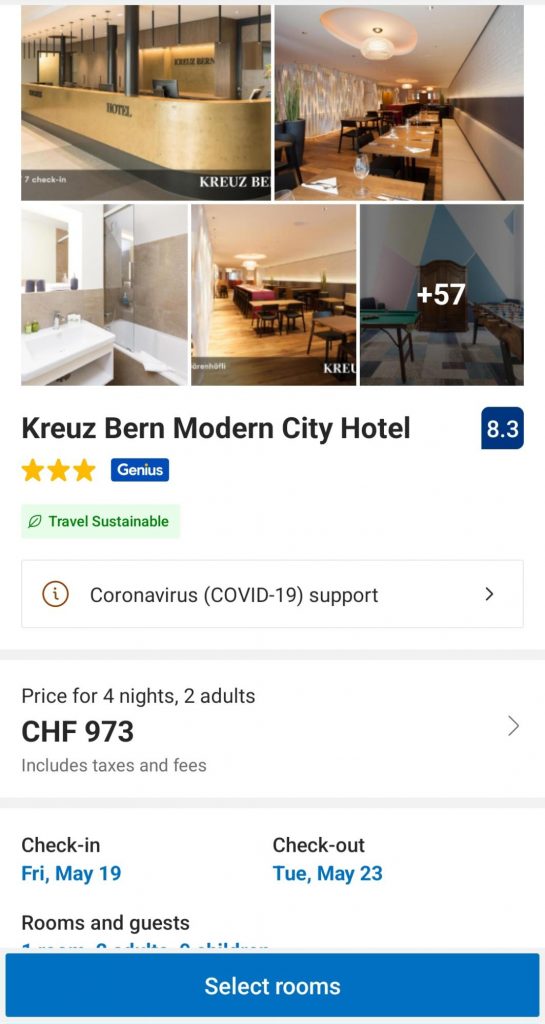
Currency management
Did you notice that Swiss francs (CHF) were the currency in the image above? That’s because the property is located in Switzerland. While you can always choose your preferred currency to view the prices in, the price will be based on the exchange rate on that day.
That’s automatic currency management at work. By converting currencies on the go, this feature helps adapt the results and improve the overall experience with your hotel app.
Booking
The heart of any hotel booking app, this feature allows to reserve and book a property to stay. There are multiple ways to implement booking, but the instant one is the most popular among those building a hotel booking app.
Unlike the traditional booking feature that involves the host approving or rejecting a booking request, the instant one ensures that the booking is made immediately. There’s no need to wait for the host for approval, which leads to a better overall experience.
In-app payment
Users must be able to not only reserve, but pay for their bookings with popular methods without leaving the app. All they need to do is enter their payment details, choose how to pay (GooglePay, a credit card, etc.) and confirm the transaction.
Enabling this feature requires integrating a payment gateway—a service that authorizes payments and processes them on behalf of the app’s owner. Having a gateway that supports various currencies and allows as many as possible payment methods is a good way to ensure a good user experience.
Here’s how the payment page looks in Booking.com’s app (note how many payment options are there):

Related content: 💡 How to Build a Secure Mobile App
Payment confirmation/receipt
This is a confirmation of a successful payment and booking. It’s automatically generated by the app and contains all the basic details of the stay. Guests then use this document (either printed out or in their hotel app) to confirm their stay at the chosen hotel.
Chat with hotels
Even after a booking has been made, many people often have questions for hotel staff. Parking availability, vegan menu options, room upgrades, you name it—answering these questions is very important to make every stay as delightful as it can possibly be.
A built-in instant messaging feature is a common way to get that done. After booking (and in many cases before), the app makes it possible to get in touch with the chosen hotel’s reception desk.
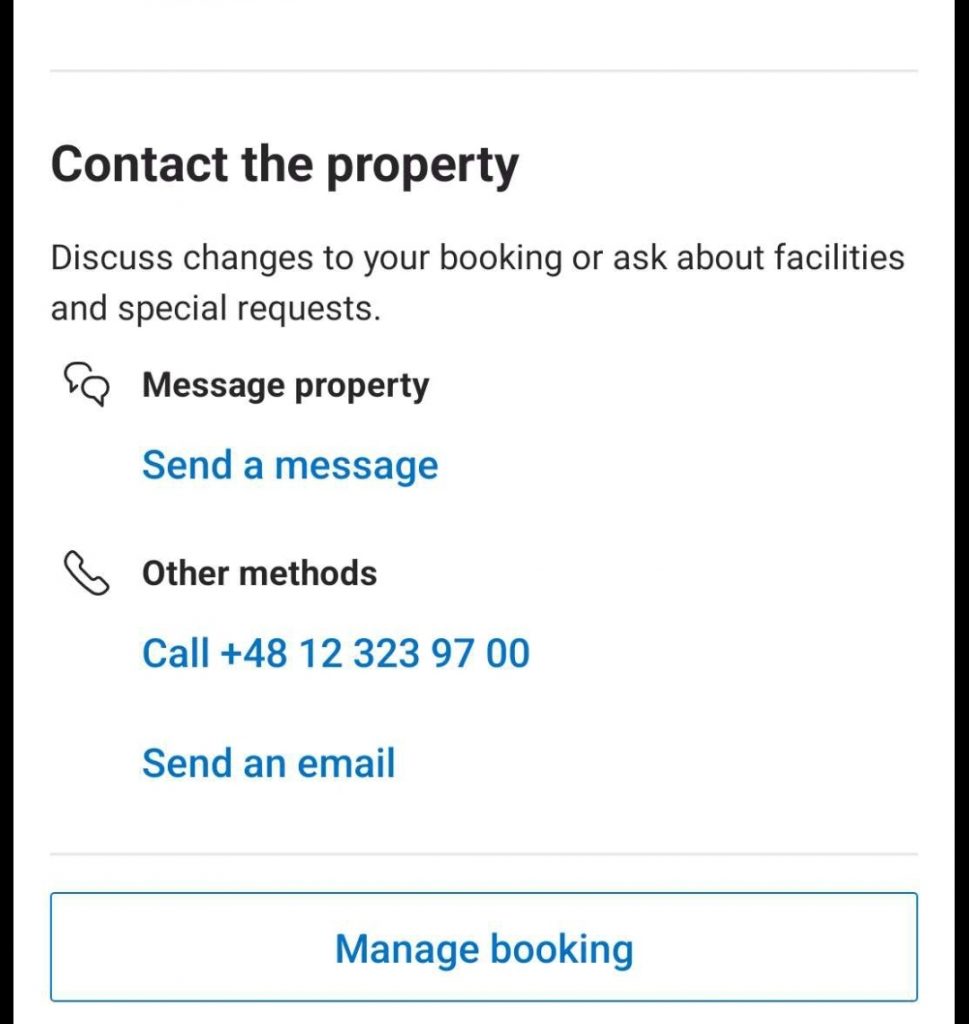
Push notifications
Push notifications are an effective way to send updates and other important messages to travelers, like:
- Reminder of check-in and check-out dates
- Notification of an answer from the hotel
- Room upgrade offers
- Special breakfast deals
- Planned activities at the hotel
Chatbot
A chatbot is an app that simulates a conversation with a customer support agent. Having a chatbot in a hotel booking app will help users get quick answers to their questions, helping you give a positive overall experience.
A chatbot can answers FAQs, like:
- Availability and prices
- Information about rooms
- Availability of additional services
- Check-in and check-out times
- Hotel location and driving instructions
You can choose which questions and answers to add during the hotel application development process. And, of course, you can add a possibility to redirect a user to a support agent in case the chatbot isn’t able to help.
Loyalty program
Hotel apps make loyalty programs readily accessible to clients. A typical loyalty program will automatically keep track of points and rewards, propose when to take advantage of them, and, most importantly, reward repeat clients for their business.
Example: here are the benefits and tiers of Accor’s loyalty program:
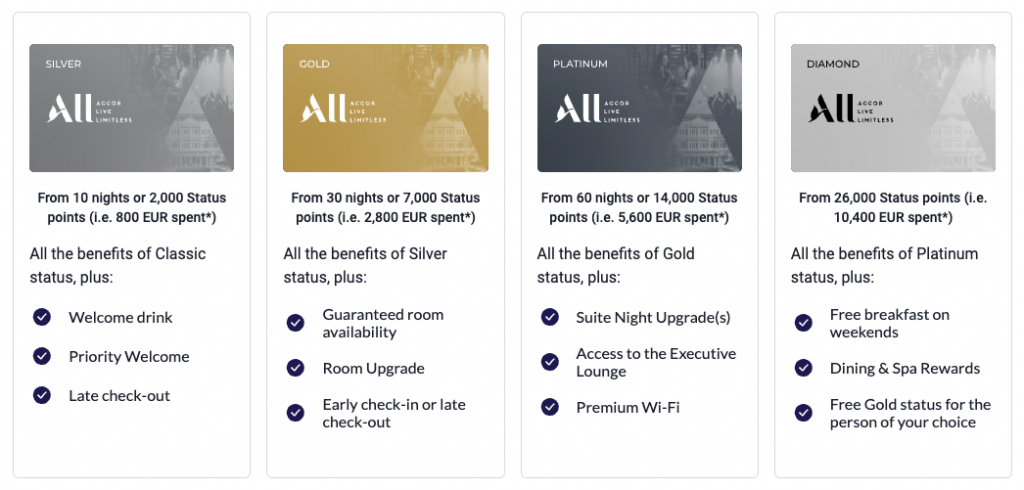
Hotel Booking App Development: 7 Essential Steps
To help you understand what goes into a hotel reservation app development process, here are the most important steps to build a hotel booking app:
1. Choose a hotel booking app development company
Before the hotel mobile app development can begin, you need to choose a partner to take care of planning the human, technical, and business aspects of the project.
There’s a lot of hotel booking app development services out there, so here’s what you should keep in mind when choosing:
- Read reviews from clients. Consider checking ratings and reviews from independent platforms such as Clutch.co
- Check portfolios. Building a hotel booking platform requires some advanced expertise and a background in developing products of similar complexity. Check “portfolio” sections on the websites of companies you’re considering
- Choose a full-service company. This means that one company can cover every step of the hotel application development process, so you won’t have to look for any extra help from others
For example—
On our own page on Clutch, you can find client testimonials, details about some of the projects we completed, as well as other helpful details:
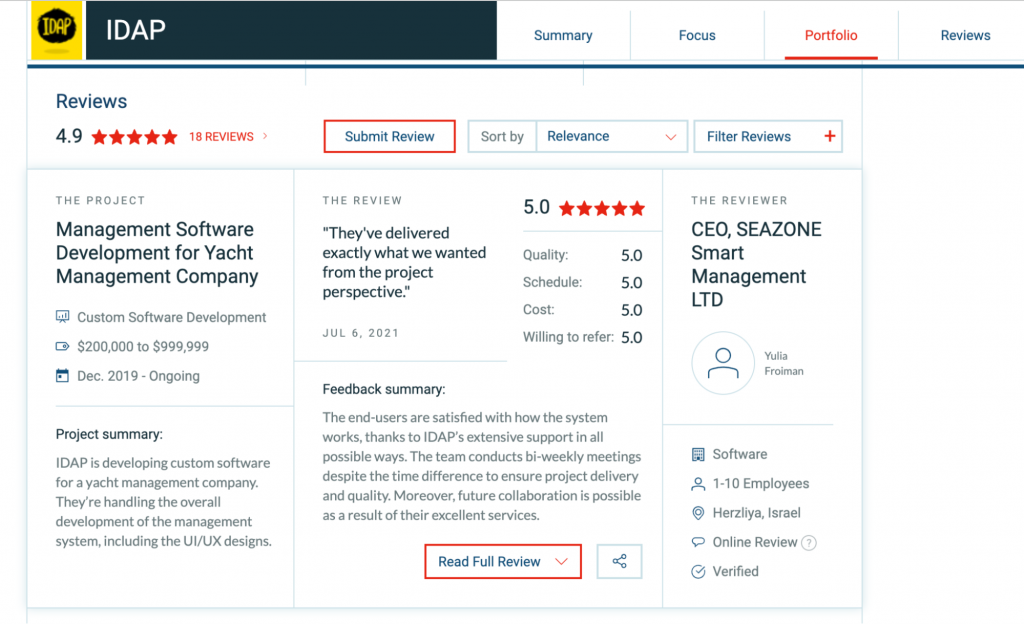
Once you’ve found some companies, get in touch with them.
Tell them your app idea, ask them if they have all the necessary expertise to complete such a project, and ask them for feedback.
2. Discovery (planning)
A discovery phase is the first essential step in the hotel booking app development (or any software development process, really).
That’s when you and your partner collect and analyze all the info necessary to understand the project goals, limitations, and target users’ needs:
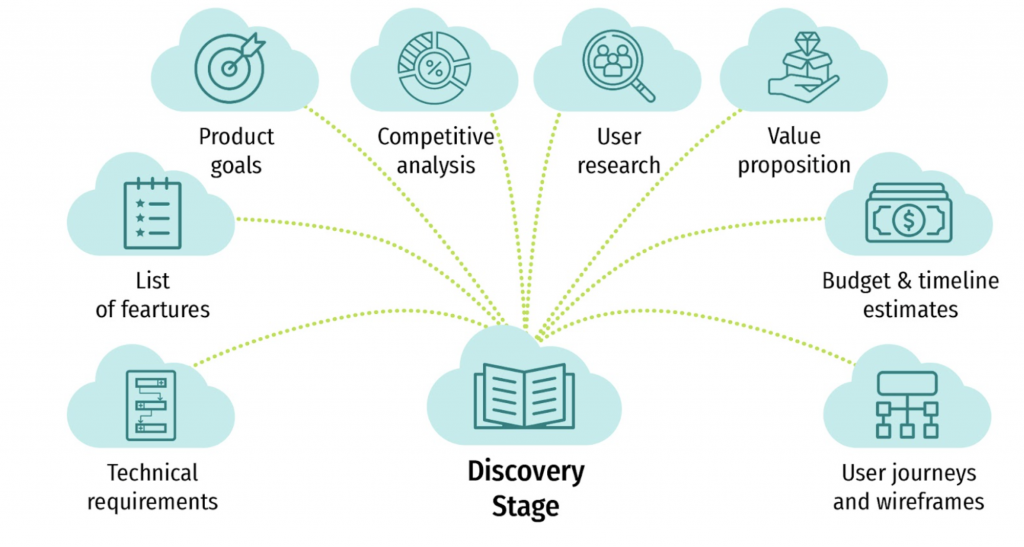
Once all the info is collected and analyzed, a few documents are made:
- Systems Requirements Specification (SRS). This is an extended description of the hotel booking app development project that includes its goals, features, and technology required to complete the product.
- Minimum Viable Product (MVP) plan. A document that contains your and your partner’s estimates on budget, team size and composition, and the time required to build the first version of the product.
- Prototype. UI/UX designers make a working mockup of a product (basically clickable screens on a computer) to help understand how the final version will look and work.
Learn more: 💡Discovery Phase in App Development [Guide for Business Owners]
3. UI/UX design
At this stage of hotel application development, your team of designers works on the appearance of the app. Now, they’re getting very specific and making a design that makes hotel booking simple and fast.
When they’re done, they share the designs with the quality assurance (QA) engineering team, which tests them to detect any inconsistencies or bugs. The final and tested interface is the outcome of this stage, and it needs to get your approval to actually be made.
Related:💡 The design phase of software development
4. App development
Now, software developers can finally start “transforming” the designs into a hotel booking app that works. At IDAP, we divide the development process into parts to deliver specific parts of the product one by one.
You as a client also stay in regular contact with the project manager and the development team to approve the developed features. In fact, you can attend daily meetings to be fully updated on the hotel booking app development process.
Related content: 💡Typical challenges in software development projects
5. QA testing
The goal of this stage is to ensure that the final version of your hotel booking app works perfectly. The QA team steps in once again to find any bugs or other issues that could still be present.
Testers typically try these processes to find bugs:
- Observing how the app behaves during hours of usage
- Completing real use cases many times (e.g. booking a room)
- Testing the app on various devices and platforms
Dive deeper:
💡 Software testing: goals, and benefits
💡 Types of software testing
6. App deployment
Now, the accommodation booking software development and testing are done, so it’s time to release the app to your chosen app store. Typically, you need to do some marketing to raise awareness of the new product and encourage people to download and use it.
7. Maintenance
The work is not quite done once your booking app is released. Now, the goal is to make sure that your hotel booking app project is successful in the long-term.
There are a few reasons why maintenance is critical:
- Make sure the app is compatible with platform (Android, iOS) updates
- Fix any bugs or problems that could happen in the future
- Add new features to make the app more competitive
Related content: 💡 How Long Does It Take To Make An App?
Hotel Booking App Development Cost
Developing a hotel app is a great business idea, but it requires some upfront costs. Depending on the complexity and the number of features, a hotel booking app can cost anywhere between $50,000 and $500,000 and even higher.
Here are some estimates to get a better idea:
- A simple hotel booking app, like for one small chain can cost from $50,000
- A more complex app, such as a hotel aggregator, can cost from $100,000
- An Airbnb-like app can cost from $150,000
Let’s break down what goes into the hotel booking app development cost a bit more.
Below, you’ll find the four essential mobile app development processes and their approximate costs based on app complexity:

If you’d like a more accurate cost estimate from an app development company that completed 200+ projects, please get in touch with us and choose “estimate project” as the subject of the message.
An important note: the cost of hotel mobile app development is not a one-time expense. After the app is up and running, you’ll need to maintain and update it, which also requires some resources.
Dive deeper into this topic:
💡 Custom App Development Cost [Guide]
💡 How Much Does It Cost to Make an App Like Uber?
💡 In-house vs Outsourcing. How to develop an app in 2023?
Summary
Hopefully this guide to hotel app development helped you understand all the essential pieces that go into this process. As an app development company, we know how important such projects are, so we tried to give you as much information as possible.
If you still have some questions or would like to talk about your idea of a hotel app, let’s talk! Please, get in touch with us here or write us a message on the live chat on our website.
